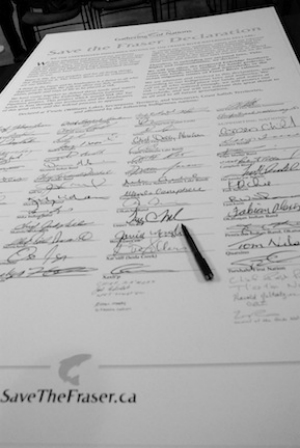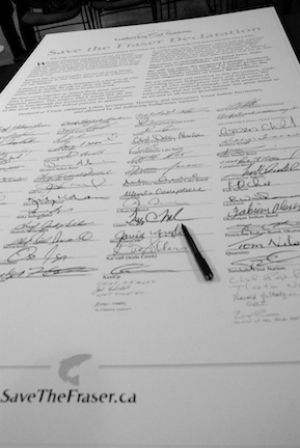
As the Yinka Dene Alliance and their allies were gathering in Ottawa to renew their opposition to Tar Sands Pipelines on March 19th, Natural Resource Minister, Joe Oliver, was in Terrace, BC, to announce the appointment of Vancouver-based lawyer, Douglas Eyford, as a “Special Federal Representative on West Coast Energy Infrastructure” to talk to BC’s First Nations about energy infrastructure.
Is the timing just a coincidence? After years of asking the feds for meaningful consultation, the Yinka Dene Alliance went all the way to Ottawa while Parliament was in session so they could speak to Members of Parliament. But the key government minister had flown to the YDA’s home province of BC to announce an appointment supposedly aimed at listening to BC First Nations.
If there were prizes for long-overdue announcements, this appointment would have the category all sewn up. In fact, with 160 Nations having now signed onto the Save the Fraser Declaration, declaring that the Enbridge and Kinder Morgan pipeline projects are against their ancestral laws, some might argue that this envoy appointment is like trying to close the barn door after the horse has bolted.
 As the government is aware, Canada’s constitution requires consultation with First Nations about decisions which could affect their Title and Rights. Let’s quickly review just a few energy-related decisions that the Canadian government has taken without consulting BC’s First Nations:
As the government is aware, Canada’s constitution requires consultation with First Nations about decisions which could affect their Title and Rights. Let’s quickly review just a few energy-related decisions that the Canadian government has taken without consulting BC’s First Nations:
- Pushing the Enbridge pipeline and tanker proposal as being “in Canada's national interest” (a position it has since backed away from);
- The creation of a new Canadian Environmental Assessment Act, and amendments to the National Energy Board Act and Fisheries Act, in Bill C-38 at the request of the oil and gas industry, and with the effect of greatly reducing federal regulation of the Enbridge and KinderMorgan pipelines and tankers proposals;
- Replacing the Navigable Waters Protection Act with the Navigation Protection Act, in Bill C-45, eliminating legal protection for the vast majority of Canada’s navigable waters, again at the request of the oil and gas industry, and again reducing regulation of BC-based pipelines and supertankers proposals;
- Changing the terms of reference for the environmental assessment of the Enbridge pipelines and tankers proposal mid-assessment to cut short the process; and
- Withdrawing, after almost a decade of work, from the Pacific North Coast Marine Conservation Area (PNCIMA) planning process after Enbridge complained that the result of the process might restrict tanker traffic.
Given this context, one might have thought that Mr. Eyford would not be surprised to learn that many First Nations are skeptical about his role, but he has reacted to criticism by saying that First Nations need to be more “open-minded”.
Better late than never?
Although late, surely it’s a good thing that the federal government is finally reaching out to First Nations?
From a certain perspective both this announcement, and the announcement of improved oil spill response systems, do make sense; they resemble good public policy and are difficult to argue with – which is more than you can say for some past government actions that actually are counter-productive for Enbridge.
But …
Genuine, good faith consultation needs to occur from the very earliest stages at which a project like Enbridge’s is contemplated, involve First Nations in setting the terms, and should not pre-suppose any particular result.
Let’s be clear that what is being proposed in terms of the Special Envoy’s work is not being called consultation. It also wouldn’t qualify as the kind of robust consultation that the Supreme Court of Canada has said is required when First Nations have a strong prima facie title claims and can expect to experience serious impacts from a project. The government has given no indication of how the Special Envoy’s report relates to the Crown’s legal obligations with respect to any particular project, including Enbridge’s Northern Gateway project. It would be more accurate to describe the Special Envoy’s role as part of a unilaterally designed and imposed process.
With respect to arguably one of the most controversial and pressing issue in the energy hopper, it deserves noting that First Nations pushed for a role in designing a consultation process on the Enbridge project that would fairly give effect to their constitutionally-protected governance and decision-making rights. The answer they received to their repeated requests? The Crown was completely unwilling to consider such a process. Instead, First Nations were told that the JRP would be the principal mechanism to address the project’s impacts on their communities and territories, even though to date, there has been no comprehensive plan offered to First Nations how the JRP can do this and what the actual process for First Nations consultation on the project will be (since the JRP does not have the jurisdiction to play this role).
It’s hardly surprising that some are now cynical about Mr. Eyford’s appointment.
Notwithstanding Mr. Eyford’s (presumably good faith) insistence that he has no hidden agenda, the government has unilaterally set up the process (despite repeated requests by BC Nations to be involved in setting the terms of any consultations) and is framing the discussion as being about expanding the energy industry’s presence in BC in a way which shares the wealth with BC’s First Nations and/or involves them in the environmental regulation of the industry. Minister Oliver explains:
The goal is clear. Douglas Eyford will help identify opportunities to facilitate greater participation by Aboriginal peoples in resource development while at the same time identifying ways in which Aboriginal peoples can play a greater role in strengthening environmental protection. Our Government believes that, by working together with Aboriginal peoples, provinces and industry, all Canadians can share in the jobs and prosperity that await us if we act now for the good of Canada.
Oh, the irony of the government offering to involve First Nations in strengthening environmental protection after systematically dismantling a host of environmental protections at the request of the oil and gas industry!
But even if we overlook that, Mr. Oliver’s above statement of the goal does not seem to contemplate that projects will ever be rejected on the basis of impacts on First Nations’ constitutionally protected Title and Rights. Furthermore, we would argue that the honour of the Crown requires the federal government to consider whether these resource development projects are consistent with First Nations own Indigenous laws and their aspirations for their lands.
The same type of language appears in the government’s media backgrounder. The envoy will…
pursue greater Aboriginal engagement on opportunities related to proposed West Coast energy infrastructure, including identifying the factors required to build greater Aboriginal support, engagement and participation on the basis of shared interests.
The message seems to be: economic growth at all costs, but with some vague promises of environmental regulation, and equally vague promises of benefits for First Nations communities, thrown in.
But this approach is consistent with past statements by the Minister, who appears to believe that the benefits of energy development to First Nations are obvious and that only a socially dysfunctional community would refuse:
The developments we are looking at have the capacity to be truly transformative to a lot of Aboriginal communities. This is really a tremendous opportunity to transform communities that have been socially dysfunctional, that haven’t had economic opportunities, haven’t had employment opportunities.
Respect for First Nations means not prejudging whether (or not) they need a particular model of economic development. It means respecting their ability to control what occurs within their territories.
So while we’re glad that the Canadian government has stated they will listen to First Nations, they need to take a step back and not pre-judge the outcome of those conversations. If they’re just trying to find some cosmetic fixes so that pipelines can continue, then they are wasting everyone’s time.
By Andrew Gage and Brenda Belak, Staff Lawyers and Jessica Clogg, Executive Director and Senior Counsel